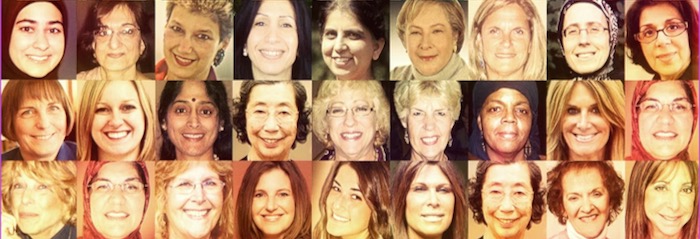
IS YOUR COMMUNITY GROWING ONLINE? The Women of WISDOM, an organization of women from many different faith traditions, already is producing new online content to connect diverse communities. This set of WISDOM images comes from the front cover of their book, Friendship and Faith. Clicking on this “tiled” display of images takes you to the book’s Amazon page. Want to know more about the group? You’ll learn more about WISDOM in the column, below.
.
By DAVID CRUMM
Editor of ReadTheSpirit magazine
“Since the start of this crisis, we are hearing from so many people that we need understanding and a place of refuge. Nothing is more important to us right now than helping people to reconnect with our communities—the communities around us, our communities of faith and culture and heritage. That’s what we do: We connect people.”
That was the call to action from Rich Homberg, the head of Detroit Public Television (DPTV) serving southeast Michigan. He was among two dozen media professionals nationwide who convened through ReadTheSpirit for a 90-minute national conversation on Friday via Zoom.
The conversation was scheduled to allow these professionals, connected with our magazine and publishing house, to check in from their isolation in the COVID-19 pandemic. However, as our meeting opened, we also found ourselves talking in the context of the fury following the death of George Floyd in Minneapolis. In fact, one of the participants in the Zoom, author Benjamin Pratt, contributed a poetic reflection for our ReadTheSpirit issue this week on the Christian celebration of Pentecost, and on our collective anguish over violence.
So, why come together like this for 90 minutes? Was it an occasion for grief?
On the contrary, as Rich so aptly described it, gathering a community is an opportunity to share good news! Nearly all of the men and women who spoke during our 90 minutes shared news about ways they are using their talents and resources to try to connect people in healing ways. During that Zoom circle—plus the additional chats, texts and emails that swirled around it—many participants expressed deep thankfulness for this gust of hopeful inspiration that blew across our connection.
Although these men and women were of many faiths, Lincoln-scholar Duncan Newcomer summed up the effect from his Christian perspective. “This is an honor and a joy. This is the invisible church becoming visible.”
And, now, in this column, we are sharing highlights of this experience—and hopeful links—with all of you.
Creating Visible Communities Online
Making largely invisible communities visible is what most of these media professionals are striving to do each day.
Speaking from DPTV, Rich recommended that the participants learn from the recent example of the multi-part PBS series Asian Americans, which is streaming now online. Although this series was announced years before the current pandemic, The New York Times reported recently, “It is arriving with an unanticipated relevance, amid the surge of racism toward Asian-Americans during the pandemic.”
The debut broadcast on PBS was national in scope—but Rich told the online group: “What I think about, when I get up every morning, is that our mission as a public television station is to help all of us understand our community. We had a long lead-time for planning on this PBS series so, way before the pandemic, we had planned a 125-person regional gathering with Asian Americans. That’s what we do to reach out with these TV series—we invite people to get together.”
He paused and added, “Then, like everyone else, we suddenly had to go to social distancing—so we switched to Zoom.”
Rich asked, “You know what happened? Our 125-person gathering became a 400-person gathering! This shows you: Even in the midst of this health crisis, we can gather our communities and provide safe places to learn about each other.”
The Women of WISDOM’s Paula Drewek said her organization is making similar plans. WISDOM is an organization of women from many different faiths whose story is told in the inspirational book of true stories, Friendship & Faith. WISDOM’s signature public programs are called Five Women Five Journeys, featuring a panel of women from five of different faith traditions talking with audiences about what they share and how they differ.
“We had some of these programs scheduled this spring, then the pandemic hit. We actually experimented with holding our big annual dinner in a carefully rehearsed one-hour Zoom presentation—and it turned out to be very successful,” said Paula, who is an emeritus professor of religion. “Now, we are beginning to tailor our signature program Five Women Five Journeys so that we can present that online. That also will have an added benefit of our being able to offer the program anywhere that people want to gather with us. Rather than limiting us, this may wind up expanding our voices.”
(You can read much more about the WISDOM organization—and the Five Women Five Journeys program at WISDOM’s own website right now.)
That’s also what author and standup comedian Bob Alper is doing. In Bob’s work, he normally crisscrosses the nation most weekends, performing professional standup shows either alone or sometimes with a Muslim and a Christian comic on the same stage. However, in a world without in-person gatherings, classic standup comedy tends to fizzle—as is apparent when watching popular late-night hosts deliver lines from their homes with no one to laugh in response.
So, in the midst of the pandemic, Bob is offering two different online formats that groups are hiring him to present. He has moved a step away from classic standup and has developed these two formats to engage and entertain audiences in other ways through humor and storytelling and reading from his popular books.
(Care to learn more? Here’s a related story about Bob’s new programs.)
What Would Abe Lincoln, or King David, do now?
One of the continuing themes in our 90-minute national conversation was the need to rally around famous figures who have the potential to draw communities together—across the political chasms that have divided the nation.
Lincoln-scholar Duncan Newcomer talked with the group from his home in Maine about his continuing efforts to produce columns about the timely wisdom of Abraham Lincoln. In this weekly Quiet Fire series, Duncan refers to Lincoln as “the soul of America, calling us to our best as Americans.” (Note: Thirty of the best Quiet Fire episodes are available in both text—and audio links—in the book 30 Days with Abraham Lincoln.)
“What I most want to share with people in our conversation, today, is that Lincoln’s wisdom continues to be more and more relevant,” Duncan said. “I have been writing for years about Lincoln’s deep wisdom in confronting times of uncertainty, tragedy and death. But, right now, there is more relevance to his wisdom than ever. I deeply believe that his spirit is incredibly important to us in this particular time.”
This comment from Duncan led to encouraging voices from other men and women on the Zoom. It also prompted several participants to reveal that they actually keep small images of Lincoln in their home offices! There was refreshing laugher when one person after another would lift up their Lincoln statuettes or photographs into the Zoom window beside them.
“Just as I said: Lincoln’s popping up everywhere!” Duncan laughed.
One of those holding up a mini-bust of Lincoln was pastor, Bible-scholar and leadership coach Larry Buxton, who joined the group from his home not far from Washington D.C.
“I’m following Duncan in the 30 Days series with a second volume called 30 Days with King David on Leadership and I am very appreciative to find that people from across the political spectrum are responding to this idea,” Larry said. He explained how his book about David will open with heart-felt forewords written for the book by Democratic Senator Tim Kaine and also Republican Andrew Card, who served as President George W. Bush’s chief of staff.
“They both ‘get it’ that we really need to find these touch-points that we all can share in learning about the timeless values behind leadership,” Larry said.
‘Don’t Miss This Moment!’
That’s when Rich chimed in again. “That’s why I’m saying: Don’t miss this moment! Yes, the news today is bad—but this also is an opportunity. A unique opportunity—an opportunity that may never be repeated in our lifetimes.”
Rich continued, addressing Duncan and Larry pointedly: “As you are seeing, it’s incredibly important to realize that millions of people are out there are trying to connect with community. That’s why you’re seeing the kind of response you’ve seen to these two books calling people together.”
‘Shining Brightly’
That message was echoed by two authors who are cancer survivors, both of whom are working on new books designed to tell stories that will, in author Rodney Curtis’s words, “bring people headlong into happiness, again.”
Rodney’s new book will be a joy-filled collection of his writings, the kind of stories readers have enjoyed in Spiritual Wanderer, and A “Cute” Leukemia, and Getting Laid (Off). (Plus, you can read lots of Rodney’s other writings in his section of ReadTheSpirit anytime for free.)
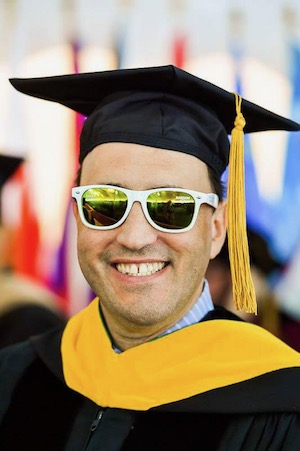
Howard Brown shining brightly on that big day at Babson along with a huge gathering of other alumni.
Howard Brown—who spent years as a leading entrepreneur in Silicon Valley and now is known for his work as a philanthropic peacemaker—also has survived advanced cancer.
In Howard’s case—twice!
He’s calling his upcoming memoir Shining Brightly, named after an overwhelming outpouring of support at an international alumni gathering for his alma mater Babson College. At that event, Howard was serving as head of the alumni association and managed to forever seal the memory of that day in attendees’ minds by passing out white-framed, gold-lens “Babson” sunglasses—inviting everyone to put them on in unison.
“You’re shining brightly Babson!” he shouted to the crowd.
They roared.
And, they remembered it.
“I agree with what Rich is saying,” Howard told the group. “I’ve been involved in online development of communities for many years and, I can tell you, we’re changing the whole dynamic right now. We’re changing it in the way our communities meet. And, as I am working on my book, we’re even changing the way a new book is produced through using online resources. We’re learning things right now that will change the way communities live and grow in the future.”
In fact, when Howard’s book is published, he will include creative calls to action throughout the book—then will invite readers to connect online to share the bright moments that they have discovered as a result of reading his true stories. He’s even planning to offer a limited edition of Shining Brightly sunglasses with early copies of his book—so stay tuned to ReadTheSpirit magazine for more on that.
‘It Takes a Lot to Keep That All Going’
On and on for 90 minutes, participants in the Zoom took to the main screen for a few minutes to describe the tireless work they’re doing to help communities survive and thrive.
Kirk Leifson, a Michigan-area representative of the Church of Jesus Christ of Latter-day Saints, talked briefly about some of the ways LDS volunteers are helping other nonprofit organizations expand their work—especially in feeding and job training. “The church has a big humanitarian arm,” Kirk said, “and it takes a lot to keep that all going.”
Kirk also is working with Joe Grimm, a professor of journalism at Michigan State University who heads the nationally known Bias Busters project. Working with many classes of journalism students, Grimm has produced a whole series of guidebooks to understanding minorities within the U.S.
“I need to thank lots of people on this Zoom for helping with our upcoming guides: 100 Questions & Answers about Members of the Church of Jesus Christ of Latter-day Saints and also 100 Questions & Answers about Evangelicals—both of which I think are important groups to understand in a national election year,” Joe told the group. “I’m glad we’ll be able to have these books out there soon.”
Stay tuned to ReadTheSpirit for news about those two book launches, meanwhile—
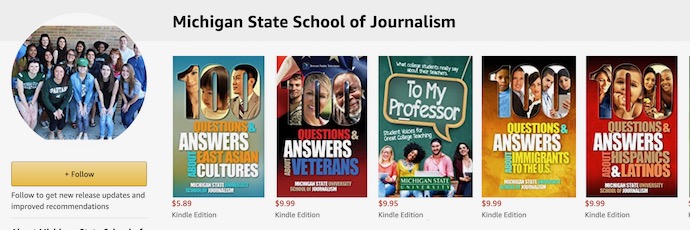
Click this snapshot of the MSU Bias Busters’ author page to visit the Amazon site and learn more about this valuable series of books about minorities.
.
‘Looking for the Meaning in Big Questions’
Writer and journalist Sherita Bryant shared a side-conversation during the Zoom with Rodney Curtis about a recent request he had received to speak at a funeral for a journalistic colleague. Sherita has had to fulfill that role, as well, and told the whole group about the challenge of trying to help knit together families at such milestones, in these difficult days of separation.
“We have to learn to talk about what it’s like to be facing our mortality right now—while still seeing that there is another side to life,” she said, noting that media professionals tend to get this kind of request to speak at memorials because everyone assumes they know how to express difficult truths in a hopeful way. She said it’s a daunting request. “It’s certainly hard to do under the cloud of death constantly around us, right now. We need to try to reassure people in these situations about life—and hope on the other side.”
(On Sunday, two days after our Zoom, Rodney did follow up with a full column about his experience with the memorial service.)
Emelia Askari, who teaches environmental-and-public-health journalism at the University of Michigan, underscored that there are, indeed, many surprising new opportunities to use our creative skills as media professionals. While everyone knows that Zoom is more impersonal than in-person meetings, Emelia said, “It also allows us to have a lot more interactions with people in a single day.”
As an outgrowth of her teaching and ongoing research at UofM, Emelia’s journalistic projects include an effort to help young people living in southeast Michigan to write their own stories. A long-time member of the Unitarian Universalist church, she also helps young people to write their own statements of faith.
“This is exciting work,” Emelia said. “I’m seeing young people reaching for the meaning in big questions they want to explore—out of the difficult situations they’re seeing today.”
Martin Davis, a journalist based near Washington D.C., echoed Emelia’s amazement at the inspiring power of true stories that draw on the wisdom of men and women who might otherwise be ignored by national media.
In fact, in the week we were Zooming, Martin had written the ReadTheSpirit cover story, headlined: “Why We Need Coaches—Even If We Don’t Have the Games.” He is working on coast-to-coast interviews with men and women who coach high school athletes. He wants to glean true stories about the powerful wisdom coaches can impart to teens.
“If you haven’t had a chance, please read that cover story—and then let me know if you’re in touch with a coach who has shaped your life in an important way,” Martin said. “I want to expand these interviews. I can tell you, these are some of the most insightful interviews I’ve experienced in years of journalism.”
He said, “I’m not a traditionally religious person, but spirituality is important in my life and we need to remember there are lots of ways we can pass along wisdom.”
‘Bringing us into the Lives of Society’s Outsiders’
“Film is one of the most powerful ways we share wisdom,” said Ed McNulty. He is the columnist for ReadTheSpirit’s weekly Faith & Film section and also the author of Jesus Christ Movie Star, a book that collects some of his most thought-provoking articles about Jesus in Hollywood films.
“I’ve been writing about films for many many years and my focus is always to bring the relevance of scripture and faith to these films,” Ed said. “But right now, I’m finding that it’s especially important to write about the films I love most—which are films that bring us into the lives of society’s outsiders. Every week, now, I’m very concerned to relate the films I’m recommending to people to the relevance of everything that’s going on around us.”
Building Future Interfaith Relationships
Finally, one other theme that ran throughout the 90-minute conversation was the need to specifically focus on shoring up interfaith relationships in communities where social distancing has closed houses of worship.
Near the end of our conversation, Rich’s opening call to action was echoed by Bob Bruttell, an emeritus professor of religion and co-founder of the Interfaith Leadership Council of Metropolitan Detroit.
“When all of the disruption from the pandemic hit us, those of us working on the council’s projects thought at first: Well, this is something we’ll have to work around for a month, or maybe a couple of months,” Bob said. “Then suddenly we woke up to the realization: This is something we’re going to be doing for a year! This awareness really surprised us and made us think about what we’re doing in new ways.
“This really is an opportunity,” Bob continued. “Now, we’ve got people putting a lot of our resources and programs online in creative ways.”
“I’m certainly doing everything I can to keep those connections alive,” said Victor Begg, author of Our Muslim Neighbors. Originally born in India, Victor devoted many years to interfaith leadership in Michigan and now is active in the region around his Florida home.
Addressing the Zoom participants, a majority of whom were Christian, he said, “You know I’m Muslim but, last year, my book was launched in a synagogue—and I’ve spent many years building Christian, Muslim and Jewish relationships all over the country. We can’t meet in person at the moment—OK. So, now, I’ve got a Zoom book talk scheduled with a synagogue. We have to change and use the tools we can to keep reaching out. Like Rich said, I welcome all these opportunities.
“You can go to my website and contact me. I’m involved in many different projects. When Ramadan ended this year, our Eid program at our mosque was put on local television for an hour, then that was put up online for people to see anytime if they want to know what happens at the Eid. It’s a good hour to watch. We’ve got to keep building these resources.
“You know, it’s so important we help each other,” he concluded. “And it’s really very easy to do, even on social media by adding a supportive comment or clicking a ‘like’ or sharing good news.”
Acting on that Advice Right Now
ReadTheSpirit Marketing Director Susan Stitt had the last word in an email she sent to participants after the Zoom ended—because so many of the men and women had asked for specific steps to take toward stronger connections.
Susan wrote: “It was wonderful seeing all of you today! What a treat to match faces to the many names that previously had only been email signatures. My request from the meeting today is that you respond, just as many people asked, by connecting with our publishing house social media pages.”
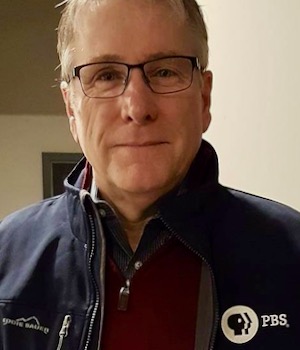

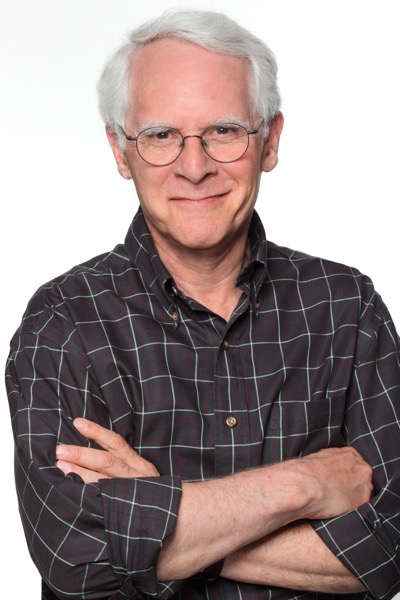
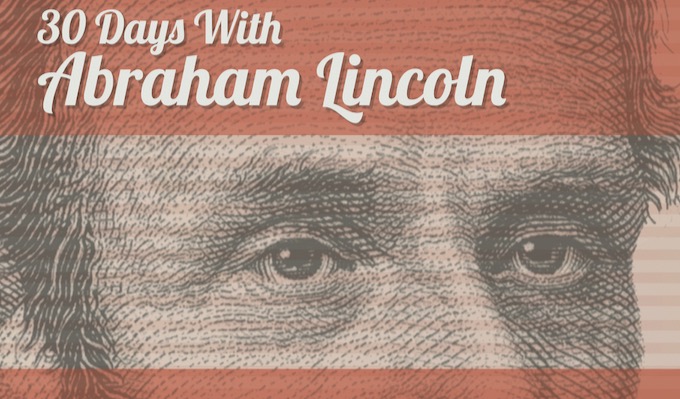


This summary Allows us to move forward with the plans and projects discussed.